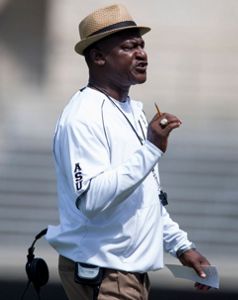MONTGOMERY, Ala. (AP) — Donald Hill-Eley didn't just listen to his players when they pointed to the challenges of juggling academics and football amid Morgan State's struggles with the NCAA's Academic Progress rate.
He has embraced the challenges himself, leading by example off the field as well.
Now coach at Alabama State, Eley went back to school in 2013 at Morgan State to pursue a doctorate in higher education and administration. He's hoping to finish that work in December, a rare feat for a head coach in a profession that often demands marathon days of practice, meetings and film study.
"I was like, you know what? I'm going back to school as well," Eley said. "Once we finish practice, we eat and shower. You go to class, I go to class.
"And that continued for about two years and then when I looked up I had completed all the course work for the doctorate. Now, it's just finding the time to finish the dissertation."
He hopes to do that and go through a review in December, not long after also finishing his first full season as the Hornets' head coach. Eley is studying the factors behind football players choosing to attend historically black colleges and universities (HBCUs). Research included sending 43-item questionnaires to the teams at Jackson State, Mississippi Valley State, Norfolk State and Hampton.
Perhaps the most prominent coach/PhD: Former Nebraska coach Tom Osborne, who had a doctorate in educational psychology.
Alabama State players say it makes a difference to see their coach practicing what he preaches.
"Some people like to preach and they don't show you," offensive lineman Tytus Howard said. "But he's actually showing you, 'Hey man I'm taking advantage of this myself.'"
Eley squeezes in work on his dissertation when he can, whether it's early in the morning, late at night or at his office desk when his schedule permits.
It helps that wife Kelley, a middle school teacher, is also in the late stages of doctoral work. They're each other's editor and sounding board.
Kelley Eley said young athletes have taken note of the fact that her coaching husband prioritizes education not just football and that "he sees being a continual learner as a path to success."
"They say things like, 'Coach, why are you getting this? What are you doing it for?'" Kelley Eley said. "He's like, 'I just want to be the best me. I just want to move as far along as I possibly can.' I think it's good for them to see."
She said they're also aware that Eley didn't come from a background where going to college was seen as a realistic path to success. Born to teenage parents, Eley was raised by maternal grandmother Mary Francis Hill. He later combined her name with that of paternal grandfather Claude Eley Jr.
Eley's department chair at Morgan State rejected his then-600-page dissertation two years ago, wanting him to narrow the scope.
He wants to give coaches a tool to better understand why prospects choose HBCUs.
"One, I think it will help save money if we can identify factors and address those factors up front," said Eley, who was Morgan State's head coach from 2002-2013. "And more importantly, if we know the factors that contribute to the student-athletes coming, then it will help us identify the population so that we can have a better recruiting tool in getting students to our campuses."
The questionnaire has players rate the importance of factors ranging from school colors to degree programs and athletic traditions. He's been surprised at how many cited travel as a big factor, saying that they had not stayed in a nice hotel or flown on a plane before college.
"The opportunity to play was right in the middle but it wasn't as big a factor as the opportunity to travel," Eley said.
He returned to the head coaching ranks after going 5-1 as Alabama State's interim coach last season. The school fired Brian Jenkins after an 0-5 start.
Eley has found another way to emphasize academics. He implemented a policy where players can lose a piece of their scholarship money for the next academic year equivalent to the credit hours of any course in which they get a D or F.
"It kind of ruffled a couple of feathers this past year," Eley said. "We have too many resources to get D's and F's. I'm fair with them that if you have gone to 80 percent of study hall and can show me that you went to get any kind of support as far as the classes, it's my fault. And I won't take your money."
In the meantime, he's doing his own academic work. Once he's done with the doctorate, he'll still be "coach" not "doctor" for defensive lineman Devin Santana.
"I'm definitely going to call him coach," Santana said, "but I may throw a doctor in there every once in a while."
___
More AP college football: http://apnews.com/tag/Collegefootball and http://twitter.com/AP_Top25
Copyright 2018 The Associated Press. All rights reserved. This material may not be published, broadcast, rewritten or redistributed.





